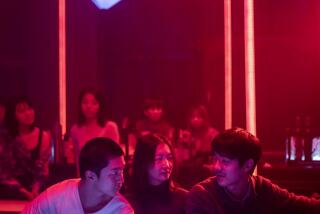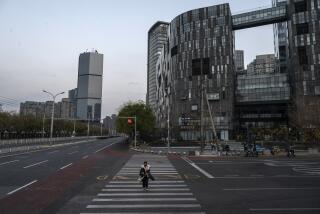‘RIVER WITHOUT BUOYS’ LAUNCHES CHINA SERIES
- Share via
“The River Without Buoys,” which launches the “New Films From China” festival at the Grande 4-plex in the Sheraton Grande, 345 S. Figueroa St., is a journey into the oppressive decade--1966-76--of Mao’s Cultural Revolution.
A number of the films in this 10-film, 20-week series (“River” will run through March 12) deal with this bleakest of periods, but if “River” happens to be the first of its kind for you, be prepared for a surprise. So frank and critical is this film that it’s hard to believe it’s from the People’s Republic of China. It even admits to the existence of sex, as well as politics.
A film of truly deceptive calm, it tells the stories of three men as they travel by raft down the Pu-shui River in Xi’an. The raft belongs to the eldest, Pan Laowu (Li Wei), a wiry, agile man of perhaps 60, who has lived off the river all his life. All three express their longing for their women. Long ago Pan Laowu lost his true love when his raft was destroyed on a reef; i.e., he could no longer afford to marry.
The next eldest (Tang Qing-ming) misses his wife but has had to leave to find work to support her and their seven children. The youngest on the raft, Shi Gui (Hu Ronghua), is consumed with desire for a woman taken away from him by the authorities and ordered to marry someone else. This is the first inkling we have of the injustices that were the lot of many Chinese in this period.
As “The River Without Buoys” moves back and forth between the men’s memories and the present, writer Ye Wellin and director Wu Tianming gradually reveal that the people have virtually no freedom of any kind. The authorities even want to deny Pan Laowu his right to fish. “We must cut off the tail of capitalism!”--that’s the oft-repeated explanation for every brutal act of oppression on the part of the Red Guards. As the men relate their experiences of injustice, they become increasingly unified in their determination to buck authority, especially when they have a chance to rescue Shi Gui’s fiancee (Li Shulan).
A journey has always been ideal for the film medium, allowing for a wealth of incident and adventure. In short, “The River Without Buoys” is beautifully structured, its idyllic settings providing a contrast to the painful events that befall the men in their struggle to preserve their freedom.
In keeping with the film’s theme, the acting is exceptionally natural for a Chinese work. Li Wei in particular is a remarkable actor of great expressiveness, and the film becomes pure poetry when his character, Pan Laowu, has a chance encounter with the woman he once loved, now forced to beg for food. Wisely, the film makers allow the two to recognize each other in a long sequence without words. “The River Without Buoys” (Times-rated Mature because of serious, complex themes) ends with a gesture of self-sacrifice on the part of its humble but noble hero, yet leaves us feeling we perhaps haven’t seen the last of him. “Even if the sky fell down I could support it!,” he exclaims boldly--and you want to believe him.
‘THE RIVER WITHOUT BUOYS’
A World Entertainment release of a Xi’an Studios production. Producer Mi Baichao. Director Wu Tianming. Screenplay Ye Wellin. Camera Liu Changxu, Chu Kongyang. Music Xu Youfu. Set designer Wang Shanan. Costumes Liu Jianzhong. With Li Wei, Hu Ronghua, Tang Qing-ming, Li Shulan. In Mandarin, with Chinese and English subtitles.
Running time: 1 hour, 39 minutes.
Times-rated: Mature.
More to Read
Only good movies
Get the Indie Focus newsletter, Mark Olsen's weekly guide to the world of cinema.
You may occasionally receive promotional content from the Los Angeles Times.







